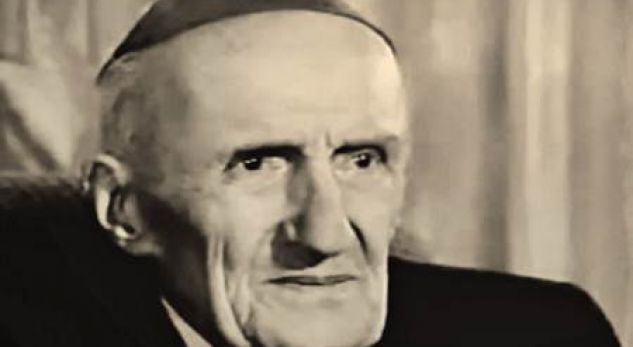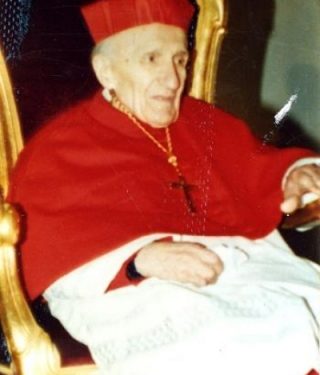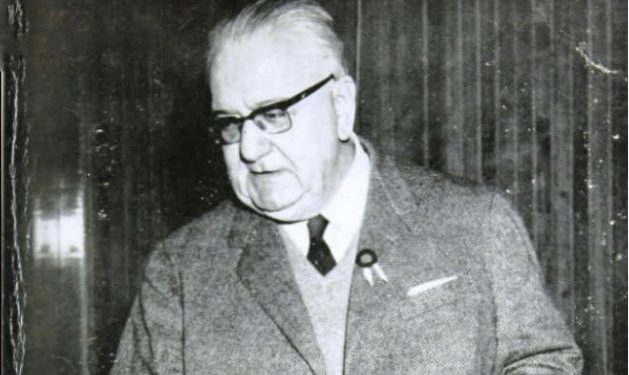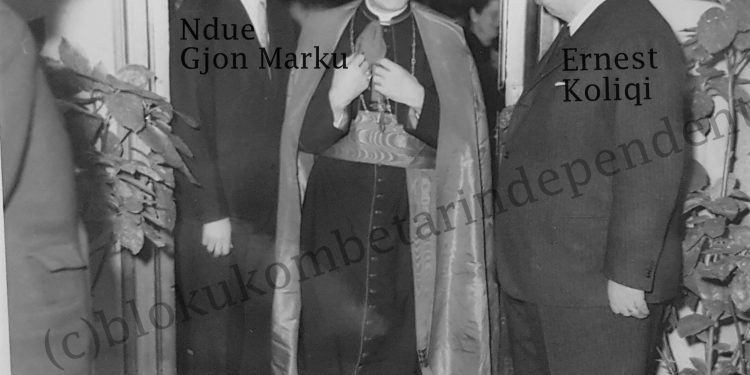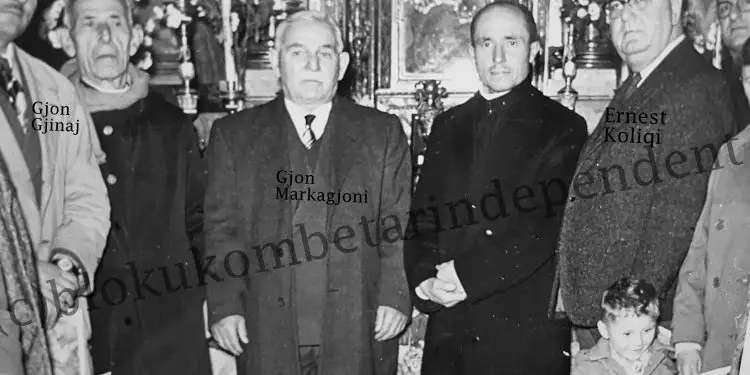By Dr. Lazar Radi
Memorie.al / Fate has it that in a span of sixty years, I meet several times with Dom Mikel Koliq. I am trying to bring you readers these very important meetings, with the highest Prelate of the Albanian Catholic Church…! I had my first meeting in Shkodër – at the end of April 1936, after the great success he had with the music of the melodrama “Rozafa”, the work of the talented playwright Dom Ndré Zadeja. At that time, Dom Mikeli was the parish priest of Shkodra and head of the “Schola Cantorum” of the city’s cathedral. I went to his cell because I wanted to know him and talk to him. At this time, in addition to being a student of the Gymnasium of Shkodra, I was also a correspondent for the newspaper “Stypi” published in Tirana.
Dom Mikeli, although he was busy with work, welcomed me with pleasure and stopped to talk with me for a long time. He was interested in life in the boarding house “Malet Tona” and the treatment we received there. He told me that during those days he was very busy, because in addition to parish work, he also needed a lot of time to compose music for some Albanian melodramas, which he had taken charge of the music.
He told me about these plays and told me that soon they would be performed in the theater hall of Saverian College. I parted with Dom Mikel, with the best impressions. With the courtesy and generosity that characterized him, he escorted me to the exit gate: – “Here in the Parish of Shkodra, the doors are open – come whenever you want, you are welcome”!
On April 26, 1936, taking advantage of the fact that I was a correspondent of the “Stypi” newspaper, I appeared at the entrance of the theater of the Saverian College, and those in charge of organizing the spectators, placed me in one of the first rows. We would watch the melodrama “Rozafa”. How many times had I gone to those famous castles, for the flow of white limestone lang, on the walls of the entrance to the castle. People have always believed in the miracle that that white limestone lang could bring to brides who have children.
Meanwhile, the hall was filling up. I was feeling very excited and I was waiting impatiently for the show to start. I saw Dom Mikel conducting the orchestra and the choir. It wasn’t long before the show began. I was following the music of the work with great attention. Dom Mikel Koliqi, appeared for the first time with a complete Albanian musical work, that is, with a melodrama written by an Albanian poet and set to music by an Albanian composer.
For me, it was something completely new, presented to the Albanian scene. Although I had a lot of emotions, I tried to keep my cool and follow the show with attention and passion. The drama, although difficult, was played very well and the musical execution was so perfect that even the best melodramas of world culture did not envy me. The content of the drama was such that it moved you even when you read it as a ballad, but not when you watched it unfold as a melodrama with music completely in the Albanian spirit.
I emphasize, it was not easy to set to music such a powerful drama as the raising of the castle and the walling of Rozafa, this young bride who really sacrifices herself, but that lens at the mercy of fate, the daughter of her own gender . Rozafa is aware that she must be buried alive, because those powerful chains required human sacrifice. It was foretold that without human sacrifice among the foundations, the castle would never be built.
This is where the sublime act begins: Rozafa sacrifices the vedi, but at the same time we also have infidelity: Rozafa should not have come to the castle, she did not have the day to bring food to the masters, she should have come from the two big brides. The two brothers, breaking their promise, did not inform their daughters-in-law about the sacrifice that was to be made – not only did they inform their daughters-in-law, but they also ordered them not to bring me the bread of the workers in the castle that day…!
In addition to the excellent drama and music, we also had the chance to listen to the choir led by Dom Mikel Koliq himself, we heard very beautiful songs, both during the performance of the play and between the acts. We had the chance to hear pieces performed by Mendelssohn, Muller, Heim and Praglias. Even the song “The return of the sheep to the ear”, composed by Muller, was repeated for the second time, because the people asked for it with endless applause.
On April 25, 1937, in the theater hall of the Jesuits, I was able to watch Zadeja’s new melodrama, “The Siege of Shkodra”. This melodrama was also an extraordinary success, because it also touched the most delicate feelings of the citizens of Shkodra – both from the point of view of national pride, and from the local one, because – indeed, that war was a great work of the population in service of the homeland, of high national ideals.
The musical parts of the melodrama “Encirclement of Shkodra” were composed with great taste and the master, Dom Mikel Koliqi, is passionate about music and with an exquisite execution master, very difficult parts of the well-known authors of world music.
There, in those walls of the castle, the epic unfolds and the immortal glory of a heroic people, who have decided to defend themselves and their homeland, the Motherland, sacrificing their lives. A fierce battle takes place at the gate of the castle, which ends with the complete victory of the Shkodrans. There is a fierce war, a neck-to-neck war, on heaps of broken prides, a war where men and women, boys and girls take part – all fight heroically, melt and sacrifice themselves on the altar of the Motherland.
In the apotheosis, the triumphant kanga bursts out: “The Sultan left/ There is nothing here, I am Albanians/ I have a flag: We will not let it go at all/ We will protect it with blood”. The performances of melodramas became part of the life of the city of Shkodra. On December 19, 1937, in the theater hall of the Saverian College, the third melodrama “Ruba e Kuqe” by Dom Ndré Zadeja was performed, again with music by Dom Mikel Koliqi. The melodrama included the events of the Albanian movements of 1910-1912.
In the shadow of an old trunk, an eternal symbol of the Motherland, the men of Malta have gathered in the Assembly. The bird, the old fiddler sings: “Home, old trunk/ I hold you longingly, Cuts the other leaf/ In the singing and dancing, In the light of the quiet hall/ The old nightingale sings, Who knows my dim lamp / That you are alive, oh little…”! At that old trunk, the Assembly of the Heads of Malcia takes place and from there the uprising is announced. That’s where the battle of Decic started. We are in 1912. It is the time of the siege of Shkodra.
In front of Shkodra spectators, a magical scene unfolds: On the shore of Lake Shkodra, the fairy of Shkodra floats on a pelican. Along with him is the Fairy of Tuscany. The latter, horrified by the bloody events of 1914, joins her sister from Shkodra and, on that dreamlike cruise, they sing together in a duet a carol, divinely composed by Dom Mikel Koliqi:
“Come on – calm seagull/ Don’t make waves, don’t make waves,/ Come on, don’t make waves,/ White shadows and pelicans/ I know what they want to say to me./ But these lonely shores/ O martyrs, not for you they are./ You bleed and skin/ In her heart you stick that skjep/ ……… White shadows of pelicans/ Hermit, of our lake,/ Your friends are silent on the other side/ In Himara, in Korça, in Vlona”! The musician of “Ruba Kuqe”, Dom Mikel Koliqi, gave the show such a shine that it was firmly embedded in the minds and hearts of all the spectators.
Both the words of the drama and its music have a powerful impact on the hearts of the Albanian youth. Precisely the flag bearer of the show, the young Ndoc Jakova, a few years later, was seen at the head of the demonstration, at the head of the youth, leading it against communism. It is precisely the fiery verses of “Ruba Kuqe”, which inspired the youth with a patriotic spirit: “Our mother is Albania/ For her when the source is called to us/ Bahna čači e bahna flia/ E Shqipës-o”.
In all these performances, Zadeja’s wonderful poetry was combined with Dom Mikel Koliq’s sweet and nerve-wracking music. All of us spectators of that time, let’s not forget those Albanian melodramas: Albanian text, Albanian music, Albanian orchestra. It was something new, that had never happened before. They create such an atmosphere that in the whole city you can’t talk about anything but those events.
There were three excellent melodramas: “Rozafa”, written in a sweet way, “The Siege of Shkodra”, epic and warlike, and “Ruba e Quqe”, the heroic and inspirational story of the Albanian Renaissance. Shkodra of the melodramas of Koliq and Zadeja, had an era in Albanian music…! As I mentioned above, I had participated in all three performances, and I would have liked to see and listen to those Albanian songs and dances several times.
All three performances left an unforgettable impression on me, because through them, my greatest wish was fulfilled, listening to music with Albanian taste and spirit. Dom Mikel’s music, which really worked with a new spirit, was beautiful, simple, catchy. Most of those kangas, especially Loredani’s kanga, give you the impression that you have listened to it over and over again, so catchy that the melody was created by Dom Mikel himself.
At the end of the show, leaving the hall, the words were ringing in their ears: “We will not let it go at all/ We will defend it with blood, we are Albanians/ I have a flag”. This was an excellent test, which proved that Albanian kangs have a perfect harmony and, if musical notes are used with mastery and taste, we had no reason to envy anyone’s artistic creations. It is a fact that after the composition of these three melodramas, Dom Mikel Koliq received numerous congratulations and congratulated him on continuing to create and give Albanian music such masterpieces…!
After five years, in the spring of 1942 – I meet in Rome with Dom Mikel Koliq. He had come to honor his brother, Prof. Ernest Koliqit, who married Vangjelia Vuçan, a teacher from Tirana. Before an elite was elected and in the presence of friends and well-wishers, they laid a wreath in a small church of the aristocratic neighborhood “Parioli”. Ernest’s wish had been for his brother, Dom Mikeli, to give him a crown. And so it was!
After the wedding celebration, as we were, we went by car to the famous street “Vittorio Veneto”, where in the hall of the luxurious hotel “Excelsior” a banquet of exceptional elegance was laid out for all of us guests. There we had the opportunity to meet and meet, also with other people of art and culture, with friends of Ernesti, who came from different countries. In that luxurious environment, at the end of the banquet, spouses Ernest and Vangjelia served us with white wedding sweets.
After the ceremony, in the lobby of that luxury hotel, we stopped for a very cordial conversation with Dom Mikel. At that time I was in the wave of studies. It was my final year and I was about to take six exams as well as my PhD thesis. Dom Mikeli, was very interested in the content of the doctoral thesis, because according to him, it seemed quite interesting: “Le consuetudini giuridiche come attivita spirituale del popolo albanese”! (Legal documents, as a spiritual activity of the Albanian people).
My choice seemed a little difficult, but I appreciate it as “beautiful and interesting”. When I told him that I would develop the thesis with the Professor of Philosophy of Law, Cesarini Sforza, he told me that he knew him and that he was a good professor and very demanding. I told him that I had been working with the Professor for a few months and that he had given me a great deal of help, to get the best out of me. After he gave me some instructions and told me some very interesting things from his experience, in the Mbishkodra Mountains, we parted ways, so that when I returned to Albania, I would go and meet him in Shkodër…!
In June of that year, I passed the six exams and the doctoral thesis. I returned to Albania, completing my legal internship. After eighteen months, I had also earned the title of lawyer, to practice as a profession in the Court of First Instance of Tirana and Durrës. Albania was experiencing difficult days. After the capitulation of Italy – German armies were installed in our country. Economic, political, cultural and social life was completely paralysed.
Towards the end of 1944, the communist government was installed in Tirana. The first action of this monstrous government was mass imprisonment: all those who had taken a nationalist stance in life, activities and society would be imprisoned. After ten years of imprisonment, I was immediately interned: first I was taken to Savër, then to Shtyllas and to Radostina…! It’s been four years in Kuç i Kurveleshi! From there they brought me back to Myzeqe, to the Gradishta camp.
There – after Shkodra, and Rome, we met again with Dom Mikel Koliq, in that tragedy that we had been carrying on our backs for years…! We gathered near the bed of the barracks, we started talking about those wonderful days, to get to that ordeal that we had experienced and were experiencing endlessly, during those times. Oh, what resistance I found in that man! His sufferings like the sufferings of Christ!! There, among the mud of Gradishta, he had built a small wooden hut, where he had placed a bed and a table.
On that table, he said mass every morning. In those beginnings there was a little liberalism…! The experience of communist repression had revealed with all its monstrosity the limitless violence. After endless prisons, the priests were interned there, as; Dom Mikel Koliqi, Dom Nikoll Mazreku, Father Mark Arapi, Dom Ndoc Sahatçia, etc., were allowed to celebrate mass in the camp. We had the right to both confess and receive communion. On occasions of major holidays, such as Christmas and Easter, they allowed us to install an altar outside and listen to mass as a group.
Like all the small and small freedoms, this privilege also ended very quickly! In the spring of 1967 – the Communist Party, savage, furious, as ever – rose again with ferocity on the attack, and with a lightning strike, destroyed all the religious institutions, in particular, rose against the churches and the Catholic Clergy , which he considered as the bulwark of the Albanian reaction.
With an unprecedented barbarism and, with a disgusting cynicism, within a few days, all the cult institutions were turned into halls of shame, into banal entertainment halls, into theaters and sports bars…! The communists always kept their eyes on Shkodra, because right there, history had to be destroyed, that in that city religion had the strongest roots and the best organization, than anywhere else.
With this absurd, inhuman act, worthy only of a bloody communism, like the Albanian one – the most monstrous blow was given to Shkodra, religion and culture. The “Front” organization of this city, on April 15, 1967, organized a meeting in the auditorium of the Pedagogical Institute, where more than 3,000 people filled not only the large faculty hall, but also the corridors and the entrance road of the Institute. with activists. That’s where the big fraud started and the hypocrisy disgusts me!
Defamations from the most brazen, lies from the most vile, attacks from the wildest and most uncontrollable, came out of the cry of the savage crowd, violently brought there, with a terrible decision. Of course, from that moment on, the life of Albanian clerics began to be more difficult than ever. It was an almost unbearable life! What Albanian communism had, no conqueror had. All religious services were strictly prohibited.
Prisons and concentration camps were the only refuge of those people who had dedicated their whole lives to God. All the clergy were informed that for any cult activity – they would be prosecuted with prison or death. Oh God! What we hadn’t even thought about, they were making it a cruel fact!!! They left no stone unturned…! For Dom Mikel Koliq and all the servants of God, the worst and most terrible times were beginning! No religious service! It was the command’s special order.
All the movements of the clergy were to be carefully observed, especially if they could give any mass clandestinely. Such an action, according to the latest guidelines, was considered a crime and could be punished. Now, both the policemen in uniform and the “volunteer” informants, were very active and for the slightest suspicion, they immediately reported to the command. Dom Mikel Koliqi, was a man who in no way agreed to violate the rules of the camp.
He refused to take any action that might contradict the command’s orders. However, even in those very difficult and very dangerous conditions, he kept a “bench” which he covered with a scarf of his own and kept under his jacket supposedly to keep him warm. With this “bench”, he lay on his bed, covered his legs and head with a blanket, for every morning – after washing and cleaning himself – he got into bed, covered his legs and head and, for each day, said his mass, which for the danger it could present, it was much more valuable than any other mass that could be celebrated, even in St. Peter’s Cathedral.
After some time, Dom Mikel – for punishment – was transferred to the Gjaza camp. Gradishta began to be considered a privileged place, because Lushnje was closer. Gjaza was a deeper village, more immersed in the mud and quite far from the city. For this reason, Gjaza was considered as the most suitable place for heavy internment, also as a kind of isolation from other internment centers. Dom Mikelin, the command did not look favorably on him! You hated him because he had a very dignified attitude, I could say majestic: he forced you to be limited in your conversation with him, to keep a little distance and respect him.
No authority – when they came to visit the camp – gave them confidence and tried to communicate with them as briefly as possible. Of course the authorities knew a lot about him! They knew that he was endowed with a very similar culture, that he knew both the classics and the moderns, they knew that he was a composer, they also knew that he was the brother of Ernest Koliq – professor of Albanian language and literature, at the Faculty of of Literature and Philosophy at the University of Rome.
Ernesti also directed the literary and cultural magazine “Shejzat”. Authorities from the Ministry of the Interior often came and asked him about Ernest: –
“For how many years, I don’t know anything about him”!
“You’re alive and well – even fat as a pig! He publishes in Rome a magazine, ostensibly literary, ‘Shejzat’ – in which he insults and denigrates us as much as possible…”!
“For several years, all my relationships have been cut off, both with my brothers and with my parents”!
“You are very clever: Your feet are never seen, it is very difficult to catch you in the wrong”!
“I know and respect the laws and regulations of the state.”
Even there in Gjaze – in that lost village of Myzeqesa – Dom Mikeli was arranged quite well in a manger, which the Command called “chamber of bachelors”. In Gjaza, of course they brought him for punishment! After in Gradishte, Dom Mikel’s very dignified attitude became unbearable and undesirable for the local communist authorities. As his conduct was exemplary, his complete silence and reserve was total. None of his movements left any doubt. His silence was complete, his total reservation, for anything that could be considered as an act of hostility towards the party and the state.
In this regard, Dom Mikeli was an example: very correct in his relations with people, by nature he was silent and reserved, few words – he said only what he needed and got along with others. He never stopped his religious activity. In a more clandestine manner, even in bed, he said his daily mass in solitude. I had a daughter in Gjaza. Taking advantage of this circumstance, I went more often to that remote and lost village of Myzeqe!
So I went not only to meet my daughter and nephews, but – I went on purpose, to meet and spend a few moments with my stoic friend, Dom Mikel. He also came to the girl’s house and, taking advantage of some solitude, he confessed and gave us communion with hosts, which he kept wrapped in a white paper. In those many years of prisons and exiles – which lasted until the overthrow of communism – Dom Mikel Koliqi remained “integral”, I never saw him get angry, never demoralized, never hold a grudge against anyone.
It was faith and divine strength that kept him strong and invincible. His faith never weakened, he never lost hope, that the Cathedral of Our Lady of Shkodra would become a church again, and, like the people of Shkodra who followed the holy figure of Our Lady on foot, to Genazzano t’ Italy, again the young people of Shkodra, would find in their Lady, the way of salvation from the great evil and getting closer to God.
Dom Mikeli – as we have learned to call him for more than half a century – had great faith in God’s miracles. This faith kept him strong and invincible, throughout the period of barbaric coercion and the most inhumane tortures. This faith in God and in his miracles gave him strength and will, he faced the tortures, tortures, accusations, trials, and endless abuses of the communists.
The tortures and privations of this evil period, not only for such a respected prelate, as Dom Mikeli, but also for the whole people, were something not human, not Albanian. His manly attitude, his heart full of mercy and love for people – was rewarded with the greatest kindness: at first archbishop and later cardinal – the first Cardinal of Albanian Catholicism.
Those of us who have known him closely, who have shared even a bite of the mouth in the savage camps of the communist regime – we know very well how stoic, how great-hearted, how patient, invincible this man was, whom the will of God, raised him to the highest rank of the Albanian ecclesiastical hierarchy. Parting from this great man, we cannot stay without saying that: the beautiful ions of the immortal melodramas, may they accompany you everywhere on your path of light and suffering. Memorie.al




